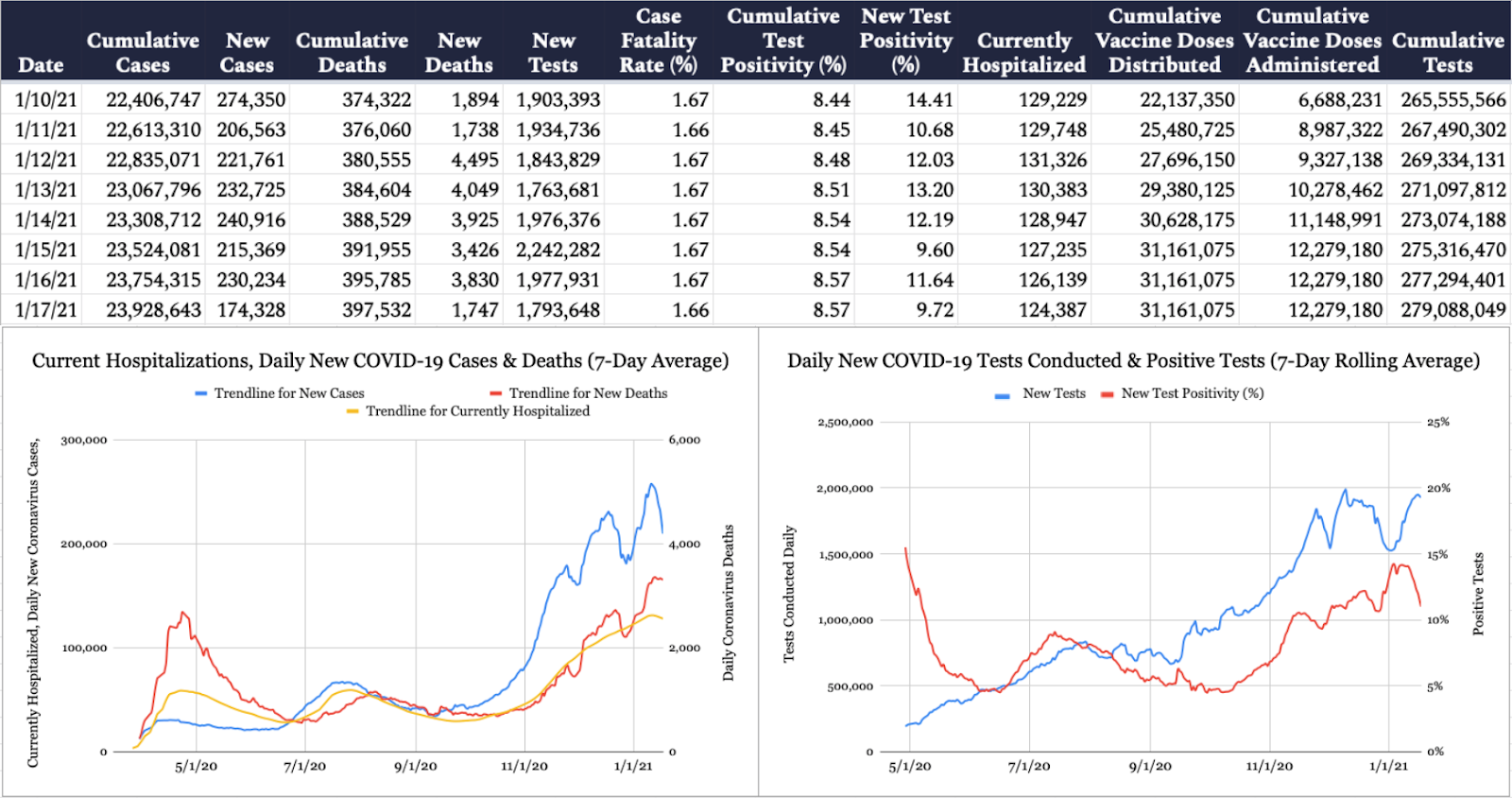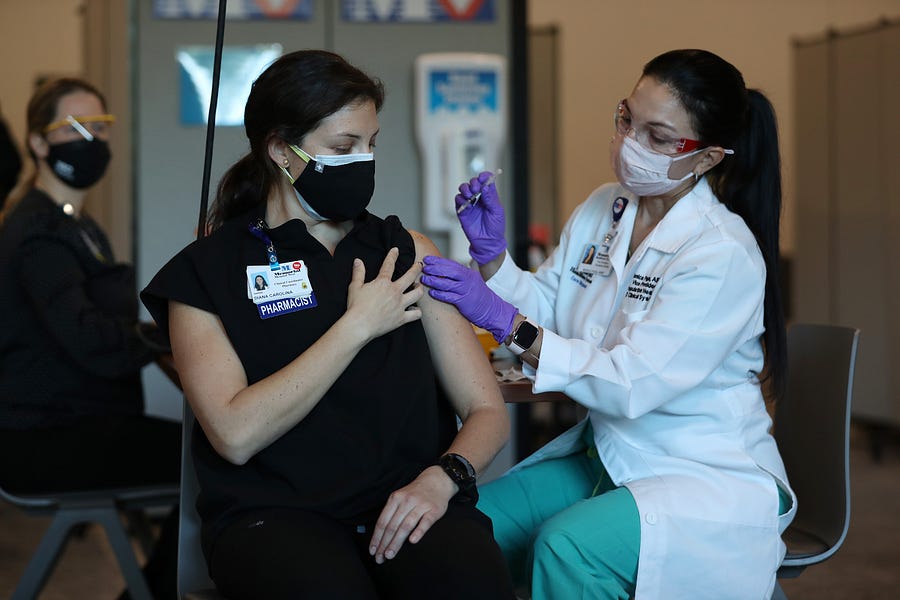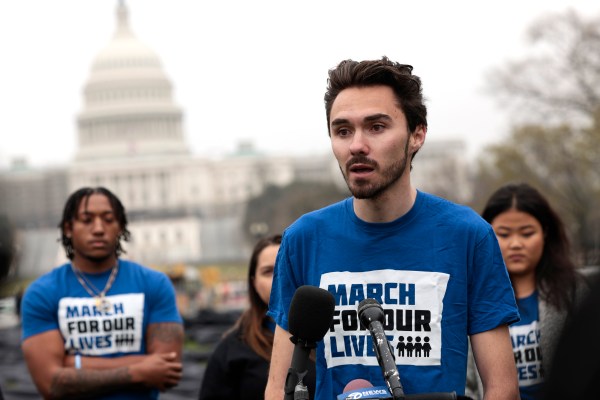Happy Monday! To paraphrase Chicago Bears wide receiver Allen Robinson and directly quote Trump administration Acting Secretary of Defense Christopher Miller: “I cannot wait to leave this job, believe me.”
Quick Hits: Today’s Top Stories
-
The National Rifle Association announced on Friday it is declaring bankruptcy, and will leave New York to reincorporate in Texas. The organization is currently under investigation by New York Attorney General Letitia James. The FBI said last week it processed a record 39.7 million firearm background checks in 2020, 10 million more than the next highest year on record.
-
The 2021 March for Life will be held virtually this year, organizers announced on Friday, citing “heightened pressures that law enforcement officers … are currently facing in and around the Capitol” and the coronavirus pandemic.
-
Yoweri Museveni—who has led Uganda since 1986—was declared the victor of the country’s recent presidential election, which international observers have widely criticized as being unfair. Museveni ordered an internet blackout in advance of the voting, and his government’s security forces repeatedly arrested and beat his main opponent, Bobi Wine, throughout the campaign.
-
Russian opposition leader Alexi Navalny—who was nearly killed by poison last year—returned to Moscow yesterday, and was immediately detained for allegedly violating probation.
-
Politico reports that President-elect Biden will rescind the Keystone XL pipeline’s cross-border permit on his first day in office. In an effort to curry favor with the Biden administration, Canada’s TC Energy Corp. had pledged the pipeline—which began construction in Montana, Nebraska, and South Dakota last fall—would rely on a union workforce and eliminate greenhouse emissions by 2030.
-
The Biden transition team announced a slew of additional political appointees over the weekend. David Kessler—who served as FDA Commissioner in the George H.W. Bush and Clinton administrations—will oversee the Biden administration’s vaccine distribution program. David Cohen will serve as deputy director of the CIA, the same role he occupied in the Obama administration. Biden intends to nominate Rohit Chopra—currently an FTC commissioner—as director of the Consumer Financial Protection Bureau.
-
Pew Research Center found President Trump’s approval rating to be bottoming out at just 29 percent as he is set to leave office, with the sharp decline being driven largely by Republicans, whose support of Trump dropped 17 percentage points since late last year. An average of approval polls finds Trump’s support dropping less precipitously to 38.7 percent.
-
The United States confirmed 174,328 new cases of COVID-19 yesterday per the Johns Hopkins University COVID-19 Dashboard, with 9.7 percent of the 1,793,648 tests reported coming back positive. An additional 1,747 deaths were attributed to the virus on Sunday, bringing the pandemic’s American death toll to 397,532. According to the COVID Tracking Project, 124,387 Americans are currently hospitalized with COVID-19. According to the Centers for Disease Control, 31,161,075 COVID-19 vaccine doses have been distributed nationwide, and 12,279,180 have been administered.

More Hiccups in COVID-19 Vaccine Distribution
In the five weeks since the U.S. began rolling out COVID-19 vaccines, the biggest issue has not been supply—it’s been getting doses into people’s arms. That dynamic appears to be changing, however, with the federal government’s vaccine stockpile dwindling in recent weeks as states ramp up the pace of their inoculation efforts.
The Washington Post reported on Friday that—despite Health and Human Services Secretary Alex Azar announcing earlier in the week a shift toward “ship[ping] all of the doses that had been held in physical reserve”—no such reserve exists, and states should not expect to see the dramatic uptick in allocations they were hoping to receive.
“Last night, I received disturbing news, confirmed to me directly by General [Gus] Perna of Operation Warp Speed: States will not be receiving increased shipments of vaccines from the national stockpile next week, because there is no federal reserve of doses,” Oregon Gov. Kate Brown, a Democrat, said Friday. “I am shocked and appalled that they have set an expectation on which they could not deliver, with such grave consequences.”
New York City Mayor Bill de Blasio said Friday he expects the city to run out of doses this week, and some hospitals and health systems began canceling scheduled vaccine appointments as a result.
“Operation Warp Speed has been monitoring manufacturing closely, and always intended to transition from holding second doses in reserve as manufacturing stabilizes and we gained confidence in the ability for a consistent flow of vaccines,” a spokesman for Operation Warp Speed said.
In a speech delivered on Friday, President-elect Biden called the U.S. vaccine rollout thus far a “dismal failure,” and outlined his plan to improve it. “If we’re getting more people vaccinated, then we need more vaccination sites,” he said. “That’s why we will harness the full resources of the federal government to establish thousands of community vaccination centers. On my first day in office, I will instruct the Federal Emergency Management Agency, FEMA, to begin setting up the first of these centers.”
In addition to more vaccination centers, the Biden administration’s vaccine distribution plan—which will shed both the Operation Warp Speed name and current leader Moncef Slaoui—includes urging states to loosen eligibility restrictions to avoid “doses of vaccines sitting in freezers unused while people who want the vaccine cannot get it,” and launching mobile vaccination clinics “to reach underserved urban areas and rural communities.” The incoming administration is also hoping to increase the number of healthcare professionals available to administer the vaccine by waiving certain licensing requirements and upping training.
Biden said he plans to invoke the Defense Production Act and work with the private sector to boost the manufacturing of vaccine-related materials like syringes, glass vials, and needles.
“All of these steps will take some time,” Biden conceded, adding that he anticipates there will be stumbles. “We will always be honest and transparent about where we stand—both the good news and the bad. We also promise to provide regular updates to you, the American people, on our progress and our goals. We will be transparent about the decisions we are making and why.”
The Trump administration maintains that criticism of Operation Warp Speed is unfounded, and driven by politics. After all, few predicted multiple vaccines with 95 percent efficacy would be available by the end of 2020. And Azar did call for states to make vaccines accessible to those age 65 and older on Tuesday of last week. “There’s no question that politics is currently playing a role in some of the spats,” one Trump administration official told The Dispatch. “If you look at the people who are complaining, a lot of them have a ‘D’ at the end of their title. … From a political perspective, I understand that it’s important for them to set expectations as low as possible.”
“Ultimately, we want this effort to be successful,” the official continued, “and we’re really proud of where we brought it.”
Dr. Howard Forman—a health policy professor at Yale University and clinician who has been administering vaccines at Yale New Haven Hospital—said Sunday the federal government’s vaccine distribution process is far from where it should be. “It’s my sense that institutions are still withholding doses to spread them out over time, because they have no guarantee of future doses showing up,” he told The Dispatch. “If I tell someone that there are 10,000 doses for this week, we’re not sure what your allocation is going to be for next week.”
Forman also had some recommendations for what the government could be doing to make things run more smoothly on the front lines. “We should have been able to immediately hire a core of people, set up an army tent of some type,” he said. “It’s easier to do it inside the hospital, but if you want to do mass vaccinations, have social distancing, and have waiting areas for people, you need to hire nurses, you need to hire even doctors for patients that do have adverse events, you need to be able to man a helpline if necessary. Those are things that, in a planned manner, the federal government coordinating with the states could have provided support.”
Still, both Dr. Anthony Fauci and incoming White House chief of staff Ron Klain said on Sunday the U.S. is well on its way to hitting the goal Biden has repeatedly laid out: 100 million vaccine doses distributed in his first 100 days in office.
“I want to give the vaccine makers credit. They are producing vaccine. We think there are things we can do to speed up the delivery of that vaccine and to make that vaccine supply go farther,” Klain told CNN. “We believe that there will be continued supply and distribution of that supply to hit that target of 100 million shots in 100 days.”
Navalny’s Got Guts
In the Russian government’s latest affront to international norms, prison service officials promptly arrested President Vladimir Putin’s foremost political opponent—Alexei Navalny—upon his return in Moscow yesterday. Navalny had spent the last five months in Germany, recovering from a Soviet-era nerve agent attack believed to be the work of Russian operatives.
Officials attributed Navalny’s arrest to violations of parole under the terms of his suspended prison sentence, which he received in 2014 on charges of embezzlement. The European Court of Human Rights in 2018 ruled that those charges were politically motivated and intended “to bring the opposition under control.”
Russia’s prison service issued a warrant for Navalny’s arrest last week in an effort to deter him from returning home and campaigning against Putin’s ruling United Russia Party. The move may have backfired, however, as the anti-corruption advocate flew to Moscow of his own free will in a show of solidarity with his supporters.
To upend the planned media gathering awaiting Navalny’s arrival, Russian officials diverted his flight from Vnukovo Airport to Sheremetyevo Airport—40 kilometers away. Supporters from St. Petersburg—where Navalny’s opposition party has garnered a significant following—were reportedly removed from Moscow-bound trains and flights. Security teams barred journalists and supporters who made their way to Sheremetyevo from entering the terminal and immediately took Navalny into custody.
On a flight from Siberia to Moscow last August, the opposition leader fell into a coma. He initially received treatment in Russia—where doctors reported no poison in his system—before being transferred to a hospital in Berlin. While there, independent labs from Germany and NATO confirmed that there was “proof beyond doubt” that Navalny had been exposed to Novichok nerve agent. The rare toxin was developed by the Soviet Union in the 1970s, and has since been at the center of a number of high-profile assassinations and attempted assassinations by suspected Russian officials.
Putin’s government has continued to deny responsibility for Navalny’s sudden illness, with Putin saying in December that if Russian special services had wanted to kill Navalny, they would have “finished it.” But an investigation from Bellingcat and CNN last month identified a team of Russian specialists that trailed Navalny for the days leading up to his poisoning, independently corroborating Moscow’s involvement.
U.S. leaders pushed back strongly against Sunday’s arrest. “Mr. Navalny should be immediately released, and the perpetrators of the outrageous attack on his life must be held accountable,” said Jake Sullivan, President-elect Biden’s pick for National Security Advisor. “The Kremlin’s attacks on Mr. Navalny are not just a violation of human rights, but an affront to the Russian people who want their voices heard.”
Outgoing Secretary of State Mike Pompeo echoed Sullivan’s condemnation. “Confident political leaders do not fear competing voices, nor commit violence against or wrongfully detain political opponents,” he said in a statement. “The Russian people, like people everywhere, deserve a government that supports an open marketplace of ideas, transparent and accountable governance, an independent judiciary, and the ability to exercise their basic human rights of speech and assembly without fear of retribution.”
Over at The Dispatch website, Jamie Fly and Tim Morrison, leading experts on both arms control and Russia, suggest it’s time to go beyond statements of concern. They urge the incoming Biden administration to disregard the advice of some top arms control advocates pushing new negotiations and call for the U.S. to take seriously the existing chemical weapons obligations Russia is violating as a signatory to the Chemical Weapons Convention:
Chemical and biological weapons programs, as opposed to missile and nuclear programs, tend to be more mobile and easier to conceal. Illicit chemical work also can be disguised at private industrial facilities—so-called dual-use facilities—or as permitted defensive research. It is for these reasons that negotiators of the Chemical Weapons Convention included challenge inspections as a verification tool.
The convention’s challenge inspection provisions were reinforced in the Senate’s bipartisan conditions that accompanied treaty ratification after a tortuous debate between Republicans and the Clinton administration. These conditions require the president—when noncompliance is suspected—to “seek on an urgent basis” a challenge inspection to reveal treaty noncompliance to the world.
Yet despite decades of concerns that several state parties, including Russia and Iran, are not abiding by the treaty, successive U.S. administrations have failed to initiate any challenge inspections, weakening the convention and encouraging treaty violators to remain party to it with impunity.
Read the whole thing, as they say.
Worth Your Time
-
There’s never a bad time to re-read Martin Luther King, Jr.’s Letter from a Birmingham Jail, but if you have the day off of work or school today, it’s the least you can do. King was arrested on April 12, 1963 for disobeying a judge’s injunction against “parading, demonstrating, boycotting, trespassing and picketing,” and a group of white clergymen issued a statement calling the peaceful protests “unwise and untimely,” adding that “when rights are consistently denied, a cause should be pressed in the courts and in negotiations among local leaders, and not in the streets.” King took issue with their words. “I would be the first to advocate obeying just laws. One has not only a legal but a moral responsibility to obey just laws,” he wrote. “Conversely, one has a moral responsibility to disobey unjust laws. I would agree with St. Augustine that ‘an unjust law is no law at all.’”
-
It’s frequently said (particularly by journalists!) that journalists are in the business of writing the first draft of history—but in the case of foundational watershed events like the occupation of the Capitol, journalists get a crack at the second and third drafts as well. That’s why, despite all the reporting on January 6 we’ve already sent your way over the past few weeks—including our own—this Washington Post piece by Peter Hermann, which includes new perspectives from a number of D.C. police officers who were on the scene that day, is still absolutely worth a read. “The zealotry of these people is absolutely unreal,” said officer Daniel Hodges. “There were points where I thought it was possible I could either die or become seriously disfigured.”
-
Or say you’re sick to death of reading about January 6, and just want something else to occupy your brain: Well, you’d be hard pressed to do better than Ben Lindbergh’s latest at The Ringer about the people who spend vast quantities of time fighting over miniscule editing decisions on Wikipedia. (One day we will finally have an answer to the question: Is it confusing to describe a picture of economist Guy Standing in a chair as “Guy Standing sitting”?)
Presented Without Comment
Also Presented Without Comment
Toeing the Company Line
-
Freshman GOP Rep. Peter Meijer—who holds Justin Amash’s old seat—joined Friday’s episode of the Dispatch Podcast to discuss what it was like certifying the Electoral College vote, evacuating the House chamber on January 6 amid the Capitol siege, and voting to impeach President Trump just days after being sworn into office.
-
Dispatch readers got two doses of the French Press this weekend. On Saturday, David urged GOP senators (🔒) to quit at long last passing the buck and convict President Trump in his impeachment trial. On Sunday, he turned his attention to white evangelicalism in America, and how it is increasingly taking on the cultural character of the South—particularly a uniquely Southern flavor of shame/honor culture that leads people to view criticism of their communities as intolerable violence against their own persons.
-
In Friday’s G-File, Jonah strikes a doleful note about the current state of popular media both left and right, along with some advice for how to chart a better path forward. “When we get fed only what we want to hear, it becomes a contest for who can sell the purest junk,” he writes. “It’s become a cliché to say we live in two Americas. If that’s true, the people running the media of each nation have an obligation to do more than just live off demonization of the other nation.” And Jonah, a Fox News contributor, has some particularly hard truths for the network that employs him. Jonah discusses all this and more on the latest episode of The Ruminant.
Let Us Know
Today, we celebrate the life and legacy of Dr. Martin Luther King, Jr.—one of the most consequential and revered leaders in American history. But support for King and his mission was not always so widespread: Just 41 percent of Americans viewed King favorably in 1963, and that number fell to just 33 percent in 1966, two years before he was assassinated.
Two questions for you: What is your favorite quotation from King, and what person or idea that is controversial or unpopular today do you believe will have near-unanimous approval in 50 years?
Reporting by Declan Garvey (@declanpgarvey), Andrew Egger (@EggerDC), Haley Byrd Wilt (@byrdinator), Audrey Fahlberg (@FahlOutBerg), Charlotte Lawson (@charlotteUVA), and Steve Hayes (@stephenfhayes).







Please note that we at The Dispatch hold ourselves, our work, and our commenters to a higher standard than other places on the internet. We welcome comments that foster genuine debate or discussion—including comments critical of us or our work—but responses that include ad hominem attacks on fellow Dispatch members or are intended to stoke fear and anger may be moderated.
With your membership, you only have the ability to comment on The Morning Dispatch articles. Consider upgrading to join the conversation everywhere.